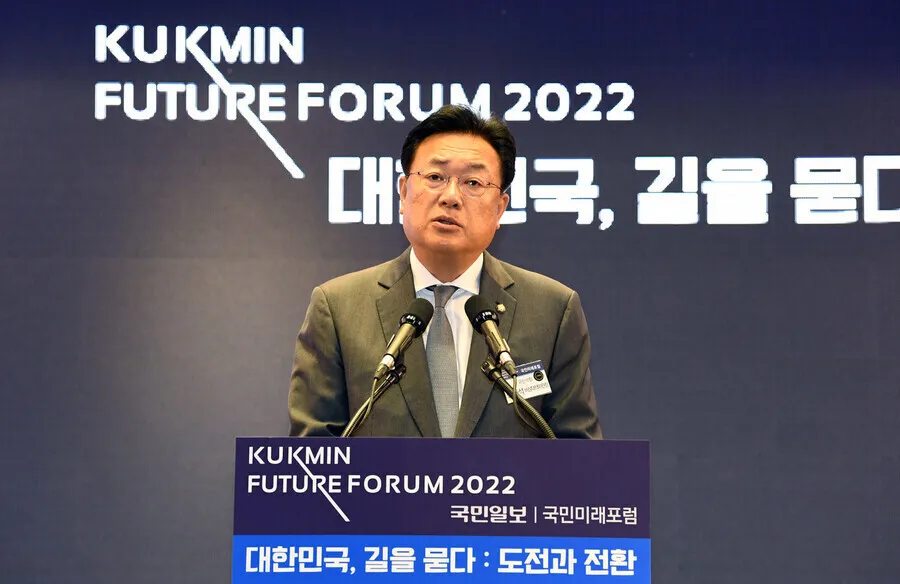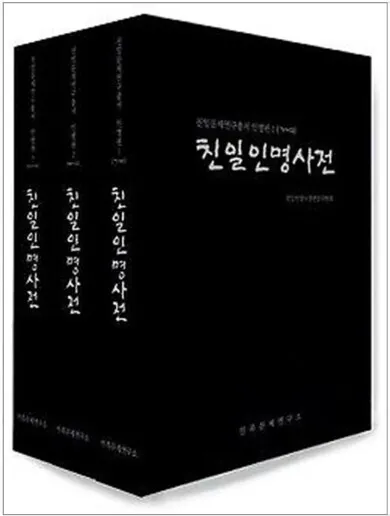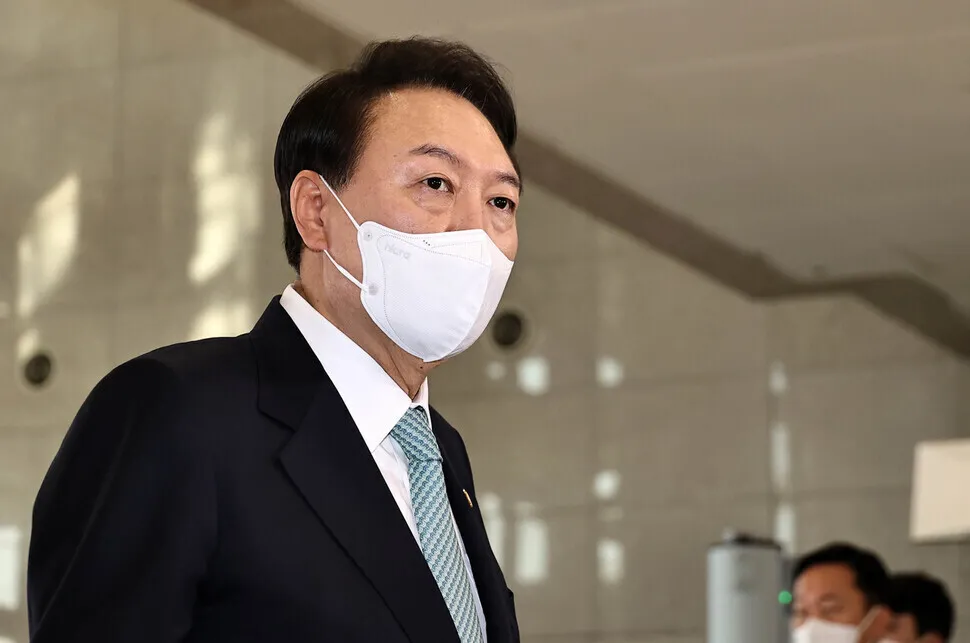hankyoreh
Links to other country sites 다른 나라 사이트 링크
[News analysis] Pro-Pyongyang or pro-Japan? Korea’s enduring war over history

South Korean President Yoon Suk-yeol and the leadership of his People Power Party (PPP) have been thrown into an uproar over repeated attacks by opposition Democratic Party leader Lee Jae-myung over their “pro-Japanese” national defense, warning that the “Rising Sun” flag of the Japanese Empire could fly over Korea once more and that the ruling party was committing “security masochism.”
Lee’s remarks appear to have touched a particularly sensitive nerve for the current administration.
The recent controversy over “friendliness” with Tokyo has been about more than just political attacks. Underlying it is a larger debate over the identity and philosophy of the South Korean administration. It’s a moment that calls for examining the historical context behind the controversy, and for harnessing the wisdom to figure out how it can be put to bed.
In the larger scheme of things, the debate over who and what are “pro-Japanese” is inextricably tied to the one over who and what can be characterized as “pro-North Korea.”
After Korea’s liberation, the same people who had been the establishment during the Japanese occupation used anti-communist values as a banner to hold on to their wealth and power. In effect, Korea’s division and war helped ensure that the collaborators held on to their vested interests.
At the vanguard of this pro-Japanese establishment were the military administrations under Rhee Syng-man, Park Chung-hee, and Chun Doo-hwan. To stay in power, they accused anti-dictatorship, pro-democracy movement members of being “communists” and had them imprisoned or killed.
Innocent people, including Zainichi Korean students and fishers, were arrested, tortured, and falsely accused of being spies. Even moderate-to-conservative opposition politicians like Kim Dae-jung were accused of being “reds,” “pro-Pyongyang,” or “pro-communist” and subjected to oppression.
The task of managing inter-Korean relations, regardless of administrationThis long tradition of the establishment leveling allegations of being pro-Pyongyang left little room for any debate over collaboration with Japan. But as the dictatorships were forced out and democracy was introduced, this ushered in a period when those collaboration activities by the establishment were investigated and made public.
One of the facts brought to light was Park Chung-hee’s signing of a blood oath in order to attend a Japanese military school in Manchuria and his adoption of “Masao Takaki” as a Japanese name. Pro-Japanese reporting by the Chosun Ilbo newspaper during the Japanese occupation also came under the microscope again.

In 2009, the Center for Historical Truth and Justice published an “Encyclopedia of Pro-Japanese Collaborators,” a project eight years in the making. When we consider how much time has passed since liberation, the debate over pro-Japan activities in Korea has been a relatively recent phenomenon.
When Japan imposed controls on exports to South Korea in 2019, this led to an increase in the number of people using the phrase “tochak waegu” — roughly meaning “Korea’s indigenous Japanese” — in digital environments. It was the most inflammatory term used in attacks against conservatives for being “pro-Japan.” Conservatives shuddered at the “tochak waegu” name.
This history explains why conservatives have responded so forcefully after Lee Jae-myung recently began using the provocative term “pro-Japanese national defense” to describe South Korea’s joint military exercises with the US and Japan.
The conservatives’ approach of demonizing North Korea and looking favorably on Japan bears ties to their global political frame for interpreting the situation surrounding the peninsula. They see the peninsula as the arena for a clash between two sides, one consisting of South Korea, the US, and Japan and the other made up of North Korea, China, and Russia.
The argument is that to emerge victorious in the battle between land and sea forces, we must throw our lot in with the US and Japan. During the Cold War era, that sort of logic made some sense.
But the global political situation hasn’t unfolded the way conservatives had hoped. In 1970, the first inter-Korean dialogue began amid a climate of detente.
In 1972, South and North Korean authorities announced the July 4 South-North Joint Communique. This was during the Park Chung-hee administration. It was the first document agreed upon by the two sides since Korea’s division. It stated three principles for “peaceful unification”: its independent achievement, the use of peaceful means, and the seeking of “great national unity.”
That document led in turn to the 1991 Inter-Korean Basic Agreement, which was reached during the Roh Tae-woo presidency, and to the Sunshine Policy and the 2000 inter-Korean summit during the Kim Dae-jung presidency. It goes without saying that the North Korean policies and inter-Korean summits during the Roh Moo-hyun and Moon Jae-in administrations were extensions of this.

Kim Dae-jung, Roh Moo-hyun, and Moon Jae-in all saw a “big picture” in which the North Korean nuclear issue could be resolved, and peace achieved on the Korean Peninsula through the development of the North’s economy and the establishment of diplomatic relations between North Korea and the US. While they made progress in various respects, they were unable to produce much in the way of results due to a combination of factors that included changes in the political situation due to US election outcomes, obstruction by hardliners in the US, and reluctance on North Korea’s part.
The readers will no doubt recall the 2005 incident in which the US government froze North Korean funds at Banco Delta Asia, or the 2019 North Korea-US summit in Hanoi that broke down due to sabotage by then-US national security advisor John Bolton.
We also saw efforts to improve inter-Korean relations during the Kim Young-sam and Lee Myung-bak presidencies. Unfortunately, relations only soured during these periods owing to factors that included Kim Il-sung’s sudden death and the death of a South Korean tourist shot at Mt. Kumgang in the North.
In 2002, then-opposition party lawmaker and future President Park Geun-hye visited North Korea and met with its leader at the time, Kim Jong-il. The two of them reached agreements on the establishment of a permanent site for reunions among divided South and North Korean family members, a joint survey of the dam at Mt. Kumgang, the linkage of South and North Korean railways, and an inter-Korean football match.
In her autobiography, Park wrote, “After visiting North Korea, I saw the way to resolve inter-Korean issues: only by building mutual trust based on sincerity can you hope to have development negotiations and pledges.”
This resolve eventually led her to promise a “Korean Peninsula trust process” during her election campaign. During her presidency, however, she failed to produce any real results.
As this shows, South Korea’s past presidents have all strived in their way to improve inter-Korean relations and resolve the North Korean nuclear issue, regardless of their personal ideologies and factional affiliations.
President’s blank slate in foreign policy, securityCurrent President Yoon Suk-yeol is a different story.
When it comes to foreign affairs and national security, Yoon is an outsider. While he claims to have some basic knowledge of economic areas due to investigations during his time as a prosecutor, he was elected to the presidency more or less as a blank slate in foreign affairs and national security terms, possessing almost no discernment or feel in that area.
Yoon’s list of foreign affairs and national security pledges during his election campaign was titled “Normalizing Inter-Korean Relations.” Underlying this was the perception that inter-Korean relations under the Moon administration had been “abnormal.”
Yoon accused the Moon administration of “making inter-Korean relations abnormal” and “damaging the public’s pride” with its “submissive approach toward North Korea.” He also said the Moon administration had “divided the public by unilaterally pursuing a military agreement and declaration ending the Korean War without a popular consensus.”
For his own part, Yoon said he would “rebuild the South Korea-US alliance.” His use of the word “rebuild” was inflammatory in itself. Did South Korea’s relationship with the US break down during the Moon presidency?
In terms of national defense, Yoon contended that “trust between South Korea and the US has been diminished by the downscaling of joint military exercises and cancellation of maneuvers,” while the “North Korean nuclear and missile threats have grown, creating weaknesses in our national security.” He also said he intended to “strengthen the South Korea-US military alliance and respond forcefully to the North Korean nuclear and missile threats.”
Is that so? Isn’t what’s happening right now the exact opposite of that?
Maybe that’s all well and fine. After all, pledges are something you make in order to win votes in an election.
The more serious problem is the lack of any philosophy or strategy. It’s tough to find any signs of a “big picture” on foreign affairs and national security in anything the Yoon administration has presented since the election: its transition committee white paper, Yoon’s inaugural address, the administration’s foreign affairs and national security appointees, or Yoon’s various speeches.
Yoon did share his “audacious initiative” for providing economic support to North Korea if it adopts a course of denuclearization. But it’s unclear how exactly the administration intends to resolve the North Korean nuclear issue, or how it plans to manage peace on the peninsula or the surrounding political environment in the long term.
This is not an era for confrontation between the South Korea, US, and Japan bloc and the North Korea, China, and Russia bloc. Our problems can’t be fixed with Cold War-era frameworks.
Yoon himself may be at a disadvantage as an outsider when it comes to foreign affairs and national security, but I have to ask if this is the best South Korea’s conservatives can manage. It’s been a tremendous disappointment.
When you lack philosophy, this inevitably translates into responses that are poorly judged and overly aggressive. In the process of countering Lee Jae-myung’s remarks about “pro-Japanese defense” and the specter of the “Rising Sun” flag flying over Korea once more, PPP emergency committee chairperson Chung Jin-suk put his foot in it when he said that the Joseon dynasty “collapsed not because of Japan’s invasion, but because of [its own] incompetence and ignorance.”
After those remarks sparked an uproar, his next move was to declare that South Korea should “scrap the Joint Declaration on Denuclearization of the Korean Peninsula if North Korea conducts another nuclear test.”
Chung’s comments were not coordinated ahead of time with Yoon or his presidential office. No matter how pressed he might feel, it’s worrying to see this willingness on a ruling party representative’s part to say anything at all if it might quiet accusations of being “Japan-friendly.”
In the wake of Chung’s remarks, we’ve heard all sorts of reckless calls for South Korea’s nuclear armament and the redeployment of tactical nuclear weapons.
We’ll have to see how Yoon Suk-yeol and Chung Jin-suk handle these issues going forward.

But what about the Democratic Party? I think it was wholly appropriate for Lee Jae-myung, as head of the opposition party, to raise questions about joint military exercises between South Korea, the US and Japan.
But he probably went too far when he attacked the Yoon administration in sensational language about a “pro-Japanese national defense.” Just as it’s wrong for the conservatives to blame the liberals for kowtowing to North Korea, it’s also wrong to try to whip up anti-Japanese sentiment in the populace by blaming the other side for being pro-Japanese.
Does the Democratic Party really need to stoop to the level of Kim Moon-soo, head of the Economic, Social and Labor Council, who still calls Moon Jae-in an “adherent of Kim Il-sung-ism” and thinks he “ought to go to the firing squad”?
Surely the current task for Lee Jae-myung and other politicians in the Democratic Party is to calmly debate what the South Korean government and public ought to do about North Korea’s nuclear weapon and missile provocations and to draft related policies.
There are many talented officials who were in charge of Korean Peninsula policy during the administrations of Kim Dae-jung, Roh Moo-hyun and Moon Jae-in. Why don’t we call them up and ask their opinion?
South Koreans are also curious about Lee Jae-myung and the Democratic Party’s vision for Korean Peninsula issues and their ability to handle those issues.
By Seong Han-yong, senior editorial writer
Please direct questions or comments to [english@hani.co.kr]

Editorial・opinion
![[Editorial] Korea, US need a ‘gentlemen’s agreement’ on what job creation entails [Editorial] Korea, US need a ‘gentlemen’s agreement’ on what job creation entails](https://flexible.img.hani.co.kr/flexible/normal/482/289/imgdb/original/2025/0911/9717575780802784.jpg) [Editorial] Korea, US need a ‘gentlemen’s agreement’ on what job creation entails
[Editorial] Korea, US need a ‘gentlemen’s agreement’ on what job creation entails![[Column] Why MAGA has its eyes set on Korea [Column] Why MAGA has its eyes set on Korea](https://flexible.img.hani.co.kr/flexible/normal/500/300/imgdb/original/2025/0911/2117575773523233.jpg) [Column] Why MAGA has its eyes set on Korea
[Column] Why MAGA has its eyes set on Korea- [Column] Lee still has his work cut out for him after summit with Trump
- [Editorial] Is this any way for the US to treat an ally?
- [Column] Lee’s difficult task of striking a balance on Japan
- [Editorial] Multipolar era means Seoul must broaden its diplomacy
- [Column] North and South Korea are no longer pawns in US-China-Russia relations
- [Column] Who we fail when we oversimplify the ‘comfort women’ issue
- [Column] How Seoul can navigate its security in a shifting world order
- [Editorial] Former first lady’s indictment is consequence of her acting as though she were president
Most viewed articles
- 1Seoul says US must fix its visa system if it wants Korea’s investments
- 2[Column] Why MAGA has its eyes set on Korea
- 3MAGA’s traveling circus comes to Korea
- 4Korea’s own MAGA evangelist brings American far right to Korean church youth
- 5Korean workers detained in ICE raid could depart US as early as Wednesday
- 6Construction hits delays at 4 LG Energy battery plants in US after Georgia raid
- 7Korea mulls how to respond if US demands ‘strategic flexibility’ of USFK at summit
- 8[Editorial] Korea, US need a ‘gentlemen’s agreement’ on what job creation entails
- 9A week after ICE raid, 300+ Koreans head to airport upon release
- 10Korean workers’ return held up by Trump’s proposal that they stay in US, Seoul says